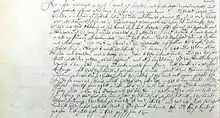Casper Van Senden
Casper Van Senden was an Elizabethan Lübeck merchant who bargained for a deal in 1596 whereby through ensuring the safe return of eighty-nine of Queen Elizabeth's subjects who had been detained in the Catholic realms of Portugal and Spain, sought to gain a licence to deport Africans from England.[1] This incident has been quoted to suggest a consistent policy of racial exclusion in sixteenth century England.[2][3]

Elizabeth's letter supporting Van Senden
Van Senden was a protégé of Thomas Sherley. He bargained for this deal in 1596, two years before Elizabeth I expelled the Hanseatic League from the Steelyard in London (Lübeck was the foremost town of the Hanseatic League). The terms of the license were set out thus:
- Casper van Senden a merchant of Lubeck did by his labor and travell procure 89 of her Ma[jesty's] subiectes that were detayned prisoners in Spaine and Portugall to be released, and brought them hither into this Realme at his owne cost and charges, for the w[hi]ch his expences and declaration of his honest minde towardes those prizoners, he only desireth to have lycense to take up so many Blackamoores here in this Realme and to transport them into Spaine and Portugall.[4]
References
- Kaufman, Miranda (2008). "Caspar van Senden, Sir Thomas Sherley and the 'Blackamoor' Project". Historical Research. 81 (212): 366–371. doi:10.1111/j.1468-2281.2007.00416.x. Retrieved 29 August 2014.
- "Black presence up to Tudor times". Black History for Schools. Black History for Schools. Retrieved 29 August 2014.
- "Elizabeth I: From Tolerance to Intolerance". Black Presence. The National Archive. Retrieved 29 August 2014.
- "Early Times". The Black Presence. The National Archive. Retrieved 30 August 2014.
This article is issued from Wikipedia. The text is licensed under Creative Commons - Attribution - Sharealike. Additional terms may apply for the media files.